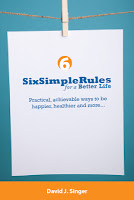Showing posts with label Lifelong Learner. Show all posts
Showing posts with label Lifelong Learner. Show all posts
Tuesday, September 18, 2012
Personal Strengths Are Behavior Patterns, Not Passive Qualities
When it comes to character development, people often use words like “quality” or “trait” to describe personal strengths like honesty, integrity, courage and perseverance. But these terms miss the mark.
The reason: The only way others can really tell if you’re honest or courageous when you face a challenge is by observing your behavior.
What do you actually DO when you’re in a situation that requires you to tell the truth or take a calculated risk? It’s not about what you say you value, it’s how you act in the moment.
Reading books to get inspired will only take you so far. And it’s not enough to think of yourself as a person who values decisiveness, compassion, and initiative. The real test is: Do you consistently make decisions in a timely manner, treat others kindly and take appropriate action without being asked to?
Many character education programs in schools these days fall far short of helping students actually become people of character. They may teach the importance of fairness, excellence, commitment and personal responsibility. But they don’t give kids the opportunity to actually develop these behavior patterns.
You build physical strength by repeatedly exercising certain muscles. Whether you’re working with a trainer at the gym or going through work-out DVDs at home, practice and repetition are keys to getting in shape.
In a similar way, you develop a personal strength by repeating a behavior pattern until it becomes comfortable. You’re actually wiring a circuit in your brain that enables you to do it automatically.
Here’s why that kind of repetition is so important.
When you face a difficult situation, you don’t always have time to think through how you’ll respond. That means you often react with a pattern you’ve ingrained over time. So what kinds of patterns have you established?
Let’s say someone asks you if you got a specific task or project done. If you didn’t, will you admit the truth or try to cover up to save face? If you’ve developed a pattern of being honest most of the time, you’ll be more likely to tell the truth in this situation.
Or you’re upset because another person didn’t follow through with something they promised to do. Do you keep your cool and maintain your composure, or do you fly off the handle and react emotionally?
So what behavior patterns related to personal strengths have you established? Have you created habits that make it easy for you to do the hard things in your work and personal life?
Until now there hasn’t been a system for helping people build these core personal strengths. Our ProStar Coach program provides the content and the structure to help you develop 40 different strengths. If you’re committed to being a lifelong learner, you owe it to yourself to check it out.
Thursday, July 5, 2012
Simple Rules to Live By
If you try to read government regulations or the dogma of some religious institutions, you’d probably find your eyes glazing over after the first page. There are too many rules to absorb. As a friend of mine likes to say, “It’s enough to make your hair hurt.”
Even if you set those intimidating documents aside, life itself is more complicated today. And yet you can choose to keep your own life simple and manageable by adopting just a few rules that guide your direction and behavior.
David Singer shows you how to do just that in his wonderful book, Six Simple Rules for a Better Life.
The co-founder and CEO of a successful insurance company, David also has a real gift for story-telling, and his book is filled with practical guidance for making your own life more satisfying.
The chapter titles state the six rules, which are very simple and easy to remember: Be Happy. Be Nice. Be a Leader. Be Organized. Be a Lifelong Learner. Be Healthy.
But simple is deceiving. David has crammed dozens of nuggets in each chapter, so you receive a wealth of valuable, useful suggestions to choose from. He’s an avid reader and includes insights from a wide range of books to illustrate his points. Best of all, he wisely advocates making incremental changes in just one or two areas rather than tackling several major things at once.
For example, while I really like order and a neat desk, I’m not always successful in keeping my “stuff” in its place. And I sometimes put off starting a big project that seems overwhelming. So two tips from the chapter, “Be Organized,” resonated with me and I committed to implement them right away.
1. “Files, Not Piles.” If you start accumulating a pile of papers on your desk, stop and go through them. Otherwise, it’s impossible to keep track of what you need to do. Anything you’re not going to handle right away needs to be added to your to-do list and then put away in a file.
2. “Eat the big frog first.” It’s easy to put off the task on your list that seems hard or scary. But the trick to harnessing your best energy is to take on that item first thing in the day. You get past your fears by making progress on the project, and it makes the tasks you work on the rest of the day seem easy in comparison.
I found myself drawn in by David’s personal stories and conversational style, and by the end of the book, I felt I’d made a new friend. Many writers of self-help books down-play their failures and focus on their successes. David’s approach is refreshingly different. He’s authentic and genuine and doesn’t try to pretend he’s perfect. He openly describes situations he handled poorly and shares what he learned from them. You can feel his passion for each rule and I came away respecting his efforts to apply them in his life...and inspired to implement them in my own.
If you’re on a quest to become your best self, you’ll find a ton of valuable tips in the pages of this book to help you on your journey.
Thursday, April 5, 2012
Personal Development - What All High Achievers Pursue
But individuals who have achieved great success in life – no matter what field – take a different approach. These folks are committed to a lifelong pursuit of becoming an even better version of themselves.
At my company we recently completed a new online personal development system called ProStar Coach. During the months leading up to its release, I was involved with some personal development of my own. We decided that videos would be an important form of media resources for our subscribers. That meant a whole lot of learning for me.
First, there was the technical side - researching the best video camera to buy and figuring out how to get the lighting right. And then there was being in front of the camera. I’d done audio recordings before, but not video, so that was something I needed to get comfortable with. Once the filming was done, I had to edit and produce it, using special software.
All this required a lot of time and energy to master. I really had to stretch outside my comfort zone. I watched online courses, read books, and practiced a lot to get proficient.
When you have the opportunity to learn something new, it’s natural to react with resistance at first. Maybe you’re afraid it’ll involve too much work or you’ll be uncomfortable trying something different. You might be concerned about making mistakes. Sure, it’s easier to stick with what you already know.
But then you wouldn’t be prepared for new opportunities– and you might not even SEE them.
When I feel over my head or intimidated by something new, what keeps me going is my goal. When you have a goal that really matters to you, it motivates you to work through discomfort and do whatever it takes to achieve your dream. Along the way your confidence builds as you realize you can do more than you thought, and that will make you more willing to try new things.
As the great Jim Rohn once said, “The ultimate reason for setting goals is to entice you to become the person it takes to achieve them.”
Remember, as long as you keep learning, you keep growing. Continue to seek new knowledge, skills and wisdom, so you’ll be prepared to handle any situation that comes your way.
And if you’re one of the 5% who’s committed to being a lifelong learner, check out ProStar Coach. You’ll discover a robust resource to help you grow in the two core areas of ability – personal strengths and people skills.
Monday, December 5, 2011
The Four Downsides of Being a Lifelong Learner
Anyone who knows me well will be stunned to read the title of this post.
How can I say there are negative aspects to ongoing self-development? I’ve always invested heavily in my own personal and professional growth – both financially and experientially. And my software company has been publishing assessment and development tools for over 17 years.
But as one for whom learning is a passion, I’ve discovered there are four downsides.
#1 – Accumulating a lot of knowledge without applying it in the real world
I admit that I rarely read novels. I prefer business books on topics like marketing, sales, leadership and personal development. That’s because I absolutely love my business, and I’m always interested in learning how to improve systems, relationships and of course, our bottom line. But sometimes I start on the next book before I’ve taken time to analyze and use the insights gleaned from the one I just read.
Lesson: For every book or program you go through, list the ideas that make sense for your situation. Then commit to implementing the one strategy that will make the biggest difference in your business or life, and hold yourself accountable for doing it.
#2 – Getting overwhelmed with too much information
As I read books and newsletters, watch DVDs, and listen to CDs, I can get paralyzed. There are so many directions to go. Is it possible to organize the mass of ideas into a cohesive action plan? And how do I deal with conflicting opinions and determine whose approach will get the best results?
Lesson: It’s about quality, not quantity. Determine the one subject, program or book to focus on, and dedicate time to it. Then use your gut as well as your rational mind to evaluate the concepts presented. Which ones sound and feel right for your business? Just one book with one idea can transform the way you do things and the outcomes you achieve. Look for the nuggets.
#3 – Spending money on the next hot idea before mastering the ones already purchased
Falling into this trap contributes to the situation described in #2. Some people call this tendency the “bright shiny object” syndrome. I’ll hear about a great solution to a business challenge, and I sometimes want to dive into that when I haven’t finished going through the materials I’ve already invested in.
Lesson: Use self-restraint and self-discipline. Say “no” to any attractive offers that come along until you’ve fully digested the one you’re consuming now. Unsubscribe from mailing lists that continually blast you with the next great offer promising to double or triple your results. Find someone who will require you to justify your reason for wanting to make a particular purchase.
#4 – Experiencing the uneasy feeling that you’re still not ready or good enough
When I’m studying the work of people who’ve specialized in a particular subject for many years, I sometimes feel inadequate. I’ve postponed taking action because of thoughts like, “If I just get a little more information about this, then I’ll be able to do that.” The truth is, there’s no end to the comparisons that could be made where I would fall short.
Lesson: No matter what field you’re in, there’s always room to grow and learn. You’ll never reach the end of what you can become, but don’t let that stop you from using the knowledge, skills and talents you already possess. Give yourself full credit for what you already have, and recognize that when you try things, they don’t have to be perfect.
The Bottom Line
Despite the drawbacks I’ve described here, I intend to continue my pursuit of becoming a better version of myself. The process of thinking about and articulating these four downsides has made me more keenly aware of their potential to harm instead of help me in my journey. As a result, I’ll keep my eyes wide open and be more careful to avoid these traps going forward.
Because in the end, it’s not about what you know. It’s about what you do with what you know.
How can I say there are negative aspects to ongoing self-development? I’ve always invested heavily in my own personal and professional growth – both financially and experientially. And my software company has been publishing assessment and development tools for over 17 years.
But as one for whom learning is a passion, I’ve discovered there are four downsides.
#1 – Accumulating a lot of knowledge without applying it in the real world
I admit that I rarely read novels. I prefer business books on topics like marketing, sales, leadership and personal development. That’s because I absolutely love my business, and I’m always interested in learning how to improve systems, relationships and of course, our bottom line. But sometimes I start on the next book before I’ve taken time to analyze and use the insights gleaned from the one I just read.
Lesson: For every book or program you go through, list the ideas that make sense for your situation. Then commit to implementing the one strategy that will make the biggest difference in your business or life, and hold yourself accountable for doing it.
#2 – Getting overwhelmed with too much information
As I read books and newsletters, watch DVDs, and listen to CDs, I can get paralyzed. There are so many directions to go. Is it possible to organize the mass of ideas into a cohesive action plan? And how do I deal with conflicting opinions and determine whose approach will get the best results?
Lesson: It’s about quality, not quantity. Determine the one subject, program or book to focus on, and dedicate time to it. Then use your gut as well as your rational mind to evaluate the concepts presented. Which ones sound and feel right for your business? Just one book with one idea can transform the way you do things and the outcomes you achieve. Look for the nuggets.
#3 – Spending money on the next hot idea before mastering the ones already purchased
Falling into this trap contributes to the situation described in #2. Some people call this tendency the “bright shiny object” syndrome. I’ll hear about a great solution to a business challenge, and I sometimes want to dive into that when I haven’t finished going through the materials I’ve already invested in.
Lesson: Use self-restraint and self-discipline. Say “no” to any attractive offers that come along until you’ve fully digested the one you’re consuming now. Unsubscribe from mailing lists that continually blast you with the next great offer promising to double or triple your results. Find someone who will require you to justify your reason for wanting to make a particular purchase.
#4 – Experiencing the uneasy feeling that you’re still not ready or good enough
When I’m studying the work of people who’ve specialized in a particular subject for many years, I sometimes feel inadequate. I’ve postponed taking action because of thoughts like, “If I just get a little more information about this, then I’ll be able to do that.” The truth is, there’s no end to the comparisons that could be made where I would fall short.
Lesson: No matter what field you’re in, there’s always room to grow and learn. You’ll never reach the end of what you can become, but don’t let that stop you from using the knowledge, skills and talents you already possess. Give yourself full credit for what you already have, and recognize that when you try things, they don’t have to be perfect.
The Bottom Line
Despite the drawbacks I’ve described here, I intend to continue my pursuit of becoming a better version of myself. The process of thinking about and articulating these four downsides has made me more keenly aware of their potential to harm instead of help me in my journey. As a result, I’ll keep my eyes wide open and be more careful to avoid these traps going forward.
Because in the end, it’s not about what you know. It’s about what you do with what you know.
Subscribe to: Posts (Atom)








